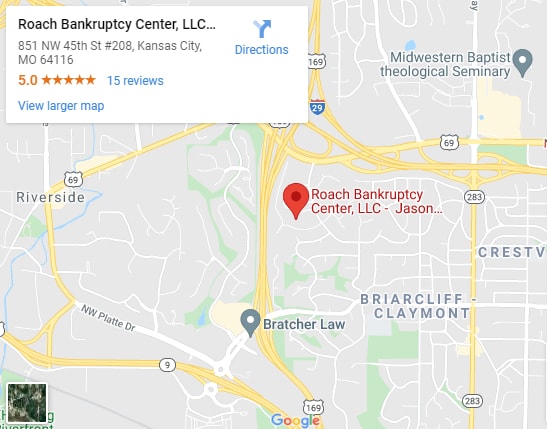Are you trying to claw your way out of debt?
Debt can be overwhelming, but for those who live in Kansas City, Missouri, there are options for relief. Bankruptcy is a legal process that can help individuals who are struggling with debt, but it’s important to understand the nine things to consider before filing for bankruptcy in Missouri to ensure a smooth-sailing process.
This blog gives you a view of the nine things to consider before filing for bankruptcy in Missouri so you don’t go about confused. Debt is a serious matter and knowing what the requirements are can make or break your situation. Should you need help throughout your bankruptcy ordeal, know that you can call one of Kansas City’s bankruptcy lawyers.
What are the Nine Things to Consider Before Filing for Bankruptcy in Missouri?
Filing for bankruptcy can be a daunting decision, but for some individuals and businesses, it may be the best option to relieve overwhelming debt. However, before taking such a drastic step, it’s important to carefully consider the potential consequences and ramifications of filing for bankruptcy.
There are nine things to consider before filing for bankruptcy in Missouri, including the types of bankruptcy available, the eligibility criteria, the impact on your credit score, and the potential consequences for your property and assets. By fully understanding these factors, you can make an informed decision about whether bankruptcy is the right choice for your financial situation.
Make informed financial decisions with the help of a Kansas City, MO bankruptcy attorney from Roach Bankruptcy Center, LLC. An attorney can walk you through the whole bankruptcy ordeal step-by-step to ensure that you get the best outcome possible.
Your Financial Situation
It is essential to consider your financial situation before filing for bankruptcy because bankruptcy is not always the best option for everyone. It’s important to evaluate your income, expenses, assets, and debts to determine if bankruptcy is the right choice for your specific circumstances.
Bankruptcy can have significant consequences, such as impacting your credit score and ability to obtain credit in the future, so it’s important to make an informed decision based on your financial situation. Touch base with a bankruptcy attorney from Roach Bankruptcy Center, LLC to help you with your situation.
Type of Bankruptcy
It is necessary to consider the type of bankruptcy to choose before filing for bankruptcy because the two primary types of bankruptcy available to individuals, Chapter 7 and Chapter 13, have different requirements, advantages, and disadvantages.
It also depends to choose the right type of bankruptcy depending on your specific financial situation and goals. For example, if you have significant unsecured debt and few assets, Chapter 7 may be the best option. If you have a regular income and want to keep your assets while paying off debts over time, Chapter 13 may be a better fit. Additionally, the Kansas City bankruptcy court has specific requirements and procedures that must be followed, depending on the type of bankruptcy chosen.
Consequences of Bankruptcy
Filing for bankruptcy in Kansas City, Missouri, can have significant consequences that affect your financial and personal life. Here are some of the consequences you may face:
- Damage to your credit score: Bankruptcy can remain on your credit report for up to 10 years, which can make it difficult to obtain credit or loans in the future.
- Impact on employment: Some employers may view bankruptcy as a negative mark on your financial responsibility, which could impact your employment opportunities.
- Loss of assets: Depending on the type of bankruptcy filed, you may be required to sell some of your assets to pay off creditors.
- Difficulty obtaining loans: Even after the bankruptcy has been discharged, you may have difficulty obtaining loans or credit with favorable terms.
- Potential for legal consequences: In some cases, bankruptcy fraud or other illegal activity can result in legal consequences, such as fines or even imprisonment.
Alternatives to Bankruptcy
If you’re facing financial difficulties in Kansas City, Missouri, there are several alternatives to bankruptcy that you may consider. Here are some options to explore:
- Debt management: A debt management plan involves working with a credit counseling agency to create a repayment plan that works for your budget. The agency negotiates with creditors to lower interest rates and monthly payments, and you make a single payment to the agency each month.
- Debt settlement: Debt settlement involves negotiating with creditors to pay a lump sum of money to settle your debts for less than what you owe.
- Loan modification: If you’re struggling to make mortgage payments, a loan modification may be an option. This involves modifying the terms of your mortgage to make the payments more affordable.
- Budgeting and expense reduction: Reviewing your budget and cutting expenses where possible can help you get back on track financially.
- Selling assets: Selling non-essential assets, such as a second car or vacation home, can provide extra funds to pay down debt.
- Negotiating with creditors: If you’re struggling to make payments, contacting your creditors to negotiate a payment plan or reduced settlement amount may be an option.
It’s important to understand that these alternatives may not be suitable for everyone, and the effectiveness of each option depends on your specific financial situation.
Bankruptcy Costs
Understanding the costs associated with bankruptcy is critical to ensuring that you’re making an informed decision about whether bankruptcy is the right choice for you. Here are some costs to consider:
- Filing fees: There are filing fees associated with filing for bankruptcy, which vary depending on the type of bankruptcy filed.
- Attorney fees: Hiring an experienced bankruptcy attorney involves additional costs.
- Credit counseling fees: Individuals filing for bankruptcy are required to complete credit counseling courses, which involve fees.
- Court fees: There may be additional court fees associated with the bankruptcy process, such as the cost of copies or transcripts.
- Trustee fees: Depending on the type of bankruptcy filed, there may be trustee fees associated with administering the bankruptcy estate.
Creditors’ Claims
Creditors’ claims are an essential part of filing for bankruptcy. A creditor is someone to whom you owe money, such as a credit card company or a mortgage lender. When you file for bankruptcy, you are required to list all of your creditors and their claims against you. Here are some key things to know about creditors’ claims in bankruptcy:
- Creditors can file a claim against you: If a creditor believes that you owe them money, they can file a claim against you in the bankruptcy case.
- Claims are evaluated by the trustee: The bankruptcy trustee evaluates each claim to determine its validity and priority.
- Priority claims are paid first: Certain claims, such as taxes and child support, are given priority and are paid before other claims.
- Unsecured claims may not be fully paid: Unsecured claims, such as credit card debt, may not be fully paid in a bankruptcy case.
- Secured creditors may retain collateral: If a creditor has a secured claim, such as a mortgage or car loan, they may be able to retain the collateral if the debt is not paid.
- Some debts cannot be discharged: Certain debts, such as student loans and some taxes, cannot be discharged in bankruptcy.
Exemptions
In Kansas City, Missouri, exemptions refer to property or assets that are protected from being seized or liquidated in bankruptcy proceedings. State and federal laws determine these exemptions, and they vary depending on the type of bankruptcy filed. Some key things to know about exemptions in filing for bankruptcy include
- Exemptions protect certain assets: Exempt assets typically include things like a primary residence, personal property, retirement accounts, and certain types of income.
- Federal exemptions may also apply: In some cases, federal bankruptcy exemptions may be used instead of state exemptions.
- Homestead exemption: In Missouri, the homestead exemption protects up to $15,000 of equity in a primary residence.
- Personal property exemption: Missouri residents may also be exempt up to $3,000 of personal property, including furniture, clothing, and household goods.
- Retirement account exemption: Retirement accounts such as 401(k)s and IRAs are usually fully exempt from bankruptcy.
Bankruptcy Forms and Requirements
Bankruptcy forms and requirements are necessary for filing for bankruptcy because the bankruptcy process is highly regulated and documentation is needed for successful filling Here are some reasons why it’s important to understand bankruptcy forms and requirements:
- Completing bankruptcy forms accurately
- Meeting eligibility requirements
- Meeting deadlines
- Understanding legal requirements
- Complying with court orders
Call our Kansas City Bankruptcy Attorney Now!
In conclusion, if you think bankruptcy is the next best solution to your problem, it’s essential to remember the nine things to consider before filing for bankruptcy in Missouri. It’s also essential to hire an experienced and knowledgeable bankruptcy attorney to guide you through the process and protect your legal rights.
Roach Bankruptcy Center, LLC is an excellent choice for those seeking legal representation in Kansas City, Missouri. Their commitment to personalized attention, flexible payment options, and reputation for providing high-quality legal representation make them a top choice for clients seeking relief from overwhelming debt. Don’t hesitate to contact Roach Bankruptcy Center, LLC to schedule your free initial consultation and take the first step towards a fresh financial start.



